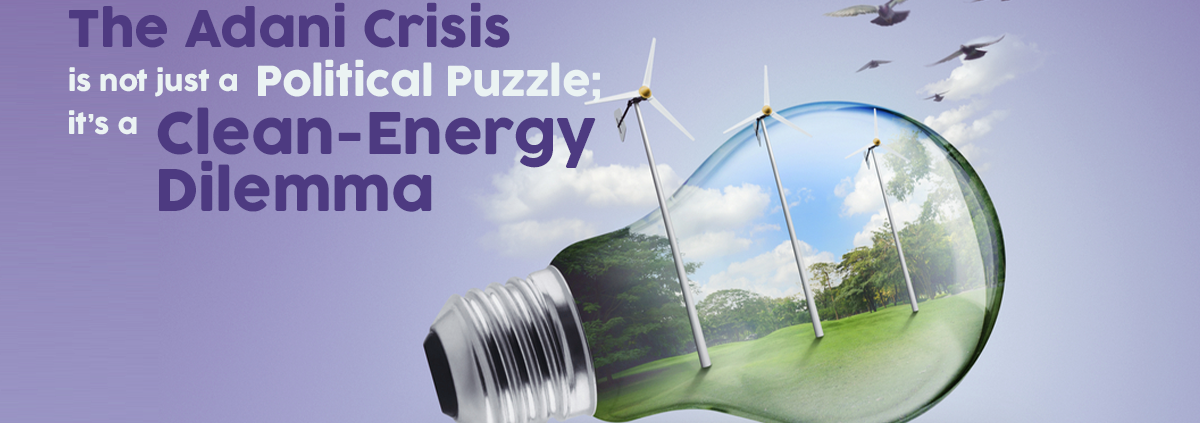“We (also) believe India’s future is being held back by the Adani Group, which has draped itself in the Indian flag while systematically looting the nation” – US short-seller Hindenburg Research, in its counter to Adani Group’s refutation of the former’s charges against it.
Those are pretty strong words, not heard often by conglomerates the size of the Adani Group. Juxtapose that with Adani’s decision to call off its fully subscribed Follow-on Public Offer (FPO) on the ground that it would be “morally incorrect”(1) to proceed with it, and one can safely assume that something is seriously amiss with the company.
Impact of the crisis on clean energy endeavours
The Adani crisis, which began on January 25 this year with Hindenburg Research making serious allegations, including accounting fraud, stock manipulation, and money laundering, has rattled markets and investors badly. It comes at a time when India is in the midst of a transition to clean energy, with the Adani Group being a major player in effecting that shift — the conglomerate has pledged an investment of $70 billion in the green energy infrastructure(2).
To meet its net-zero goals, India needs an investment of $160 billion annually through 2030, which is roughly triple today’s levels. In its 2023-2024 Budget, the Indian government announced more than $4 billion for green spending. While in itself a considerable amount, it is negligible compared to what it will really cost the country to make the energy transition. The shift to green energy simply cannot happen unless private companies with deep pockets pump in mega amounts. The Adani Group had committed to just that.
But for Gautam Adani, the man helming the group, it will now be difficult to raise funds for his stated ambitions in clean energy. Investor confidence in the Adani Group, and India as a whole, has been shaken. And it stands to reason that foreign investors are likely to pull back their capital, which was expected to go into efforts towards a clean-energy transition. The pace of investment is sure to slow down, and the much-needed capital flows for green financing may dry up.
The overall impact of the Adani crisis on India’s plans to decrease the share of fossil fuels in energy generation to 50% by 2030 (it stands at 57% today(3)) is likely to be considerable. The political implications of the saga are hard to miss — the prime minister of India is considered a close ally of Gautam Adani, with the latter’s business interests often aligning with the Government’s growth goals.
As for the Government, it has not only made no investigation into the matter but also chosen to remain largely silent on the issue. All that has emerged is a bland statement of the Parliamentary Affairs minister Prahlad Joshi(4), who said, “The government has nothing to do with the Adani matter.”
The silence will simply not be enough to undo the damage. If India is to stay on course vis-à-vis its energy transition commitment, investor doubts have to be cleared. The lack thereof will tarnish the image of the entire country. And clarity can emerge only if the Government orders a thorough probe into the matter.
- https://timesofindia.indiatimes.com/business/india-business/explainer-how-adani-v/s-hindenburg-saga-has-unfolded-so-far/articleshow/97558775.cms
- https://economictimes.indiatimes.com/industry/renewables/adanis-crisis-points-to-the-big-risk-in-indias-net-zero-plan/articleshow/97631731.cms
- https://time.com/6252115/adani-group-crisis-india-clean-energy/
- https://www.reuters.com/world/india/indias-government-has-nothing-do-with-adani-issue-minister-2023-02-03/



